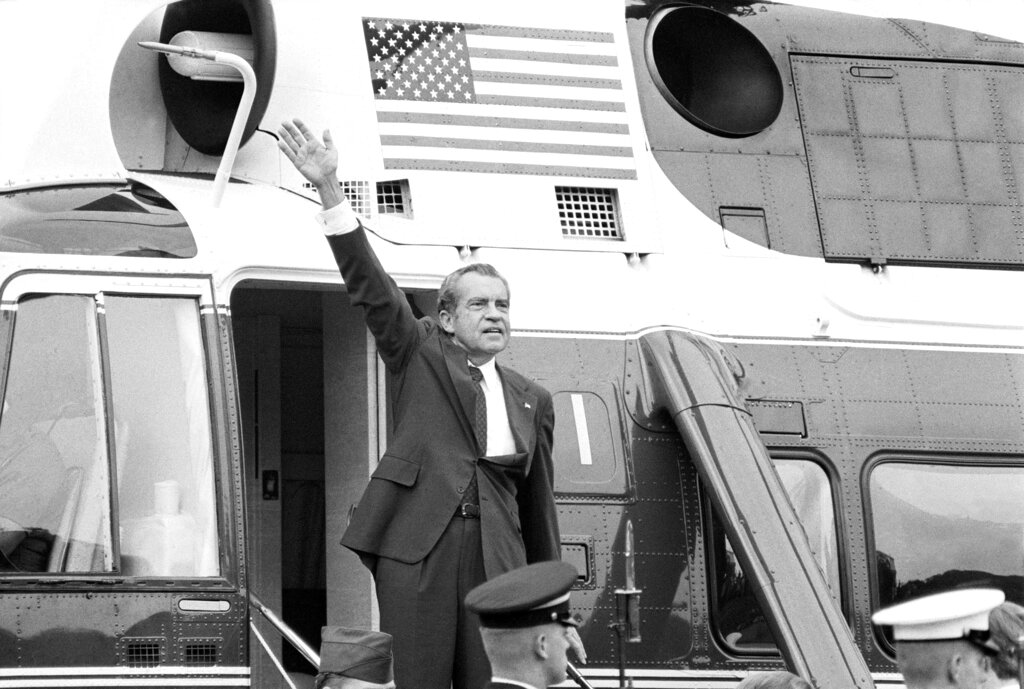Nixon’s Famed Speech of 50 Years Ago Has Much Wisdom for Our Own Era of Scandal and Manichean Politics
The 37th president rejected ‘the cynical view that politics is inevitably or even usually a dirty business.’ A year later he was forced from office.

For a historical pointer to our current era — special counsels, political scandals potentially verging into criminality, congressional investigations, popular disillusionment — it’s hard to beat the Nixon presidency.
It was 50 years ago this week, the evening of August 15, 1973, that President Nixon delivered a primetime address to the nation about the Watergate investigations.
By that point they’d blossomed into Senate hearings investigating the break-in and bugging of the Democratic National Committee headquarters at Washington’s Watergate complex, along with a possible coverup.
Nixon’s presidency was flawed by a series of policy errors — ending the dollar’s convertibility to gold, imposing wage and price controls, entering an antiballistic missile treaty with the Soviet Union, pursuing détente with Communist leaders at Moscow and Beijing.
Yet his August 1973 speech — reportedly drafted by Ray Price with some touches from Patrick Buchanan — is memorable for words that ring true just as much today as when they were uttered.
“A candidate for high office has an obligation to his party, to his supporters, and to the cause he represents. He must always put forth his best efforts to win. But he also has an obligation to the country to conduct that contest within the law and within the limits of decency,” Nixon said, in words that could apply to the Hillary Clinton campaign of 2016 and to the Donald Trump campaign of 2020.
“No political campaign ever justifies obstructing justice, or harassing individuals, or compromising those great agencies of Government that should and must be above politics,” Nixon said. “Practices of that kind do not represent what I believe government should be, or what I believe politics should be. In a free society, the institutions of government belong to the people. They must never be used against the people.”
Nixon rejected what he called “the cynical view that politics is inevitably or even usually a dirty business.” He went on to plead: “I will do all that I can to ensure that one of the results of Watergate is a new level of political decency and integrity in America—in which what has been wrong in our politics no longer corrupts or demeans what is right in our politics.”
If Watergate brought in “a new level of political decency and integrity in America,” it was short-lived indeed, as can be attested to by anyone who lived through the eras of Clinton and Trump. Nixon spoke out against “the notion that the end justifies the means,” which he said had developed in the 1960s.
“As we look at Watergate in a longer perspective, we can see that its abuses resulted from the assumption by those involved that their cause placed them beyond the reach of those rules that apply to other persons and that hold a free society together. That attitude can never be tolerated in our country,” he said.
“If we have disagreements over Government policies, let us work those out in a decent and civilized way, within the law, and with respect for our differences,” Nixon said, asking the television audience “for your help in reaffirming our dedication to the principles of decency, honor, and respect for the institutions that have sustained our progress through these past two centuries.”
It was not enough. A year later, in August 1974, Nixon’s remarks were on leaving the White House after resigning: “Always give your best, never get discouraged, never be petty; always remember, others may hate you, but those who hate you don’t win unless you hate them, and then you destroy yourself.”

Those words, too, are worth remembering this August, by supporters and haters of both Biden and Trump, by the prosecutors and defense lawyers and campaign operatives and investigative reporters and by all of us citizens trying to preserve the “decent and civilized” republic of integrity.
It can be hard to remember amid all the outrage about the FBI tapping Trump’s campaign headquarters, about Hunter Biden touting his access to his father, about Trump’s activities in the run-up to January 6, 2021.
Yet if Nixon and Watergate are to blame, as they are, for so many of the tired and tiring moves of contemporary presidential politics, his words, if heeded, may also help to offer a timely caution about where they lead, and a potential path to something better.

